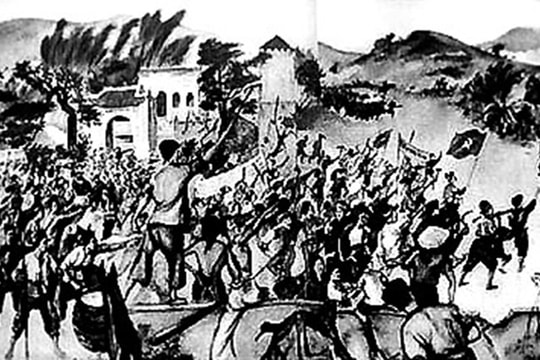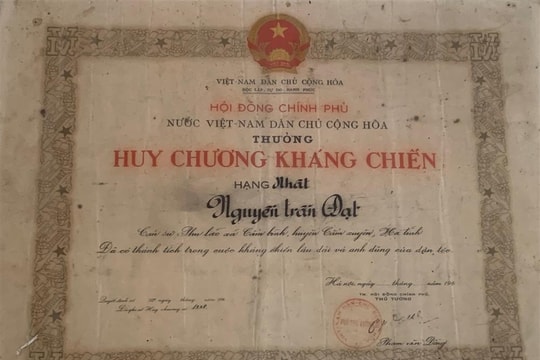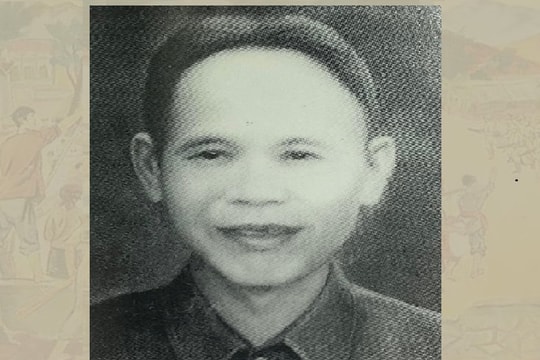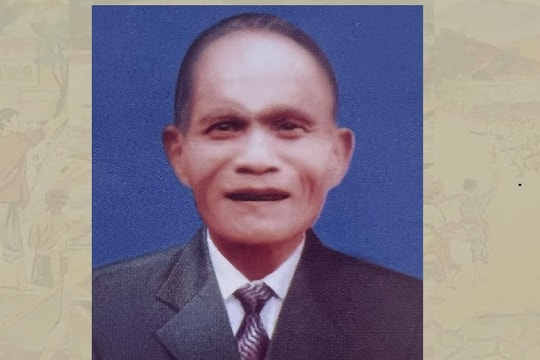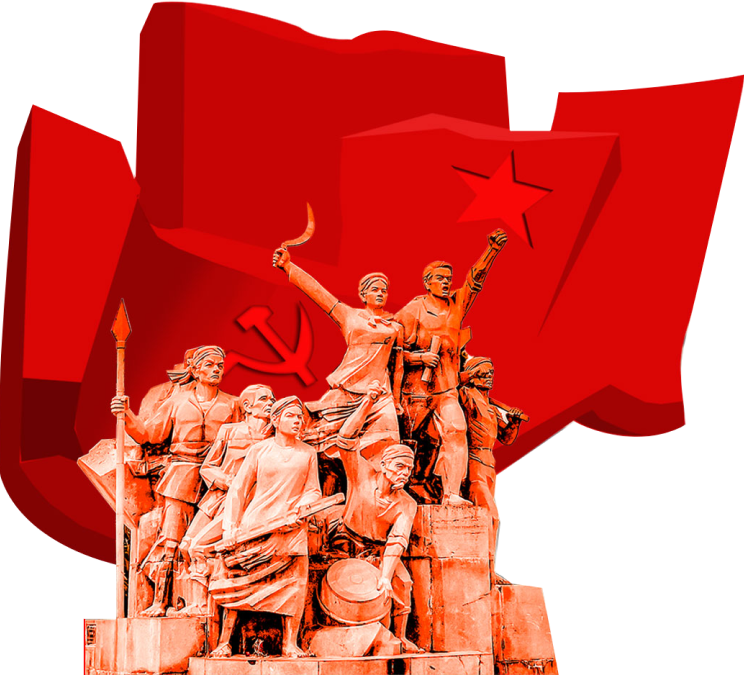Comrade Chu Hue (1903-1956): A shining example of a patriotic and revolutionary countryside
Chu Hue was born in 1903 in Cam Bao village, Hoang Truong commune (now Dien Truong commune), Dien Chau district, Nghe An province. Chu Hue was born and raised in a family and hometown with a tradition of patriotism and revolution.
His father was Chu Van Don - a village schoolteacher who taught Chinese characters to children in the area. He was intelligent, outspoken and patriotic. He participated in the anti-French movement during the Eastern Journey. His family often had friends come over to discuss social issues and comment on Phan Boi Chau's patriotic poems. Chu Hue's mother was Chu Thi Thoai, a hard-working, patient, kind woman who always shared with her husband and children. Therefore, both of them were admired by the people in the area.
The couple gave birth to three sons: Chu Hue, Chu Truat, and Chu The. Ever since he was studying with his father, Chu Hue was very diligent in his studies. He was good at both Chinese and Vietnamese. When he grew up, his father allowed Chu Hue to interact with patriotic teachers in the area. Trusted by his father, Chu Hue gradually participated in the activities of the Dong Du movement and the struggles of the villagers against high taxes between the landlords and the gentry...
Responding to the Dong Du movement, when Mr. Vuong Thuc Oanh and Nguyen Nang Tuu went to Hoang Truong commune to mobilize young people to go abroad, Chu Hue, Ho Hung, Truong Than, and Chu Trang left their hometown under the guidance of Vuong Thuc Oanh to Vinh to go to Siam via Laos. The group arrived in Laos, but the guide in Laos was not responsible for leading the group to Siam, so everyone had to return and wait for another opportunity.
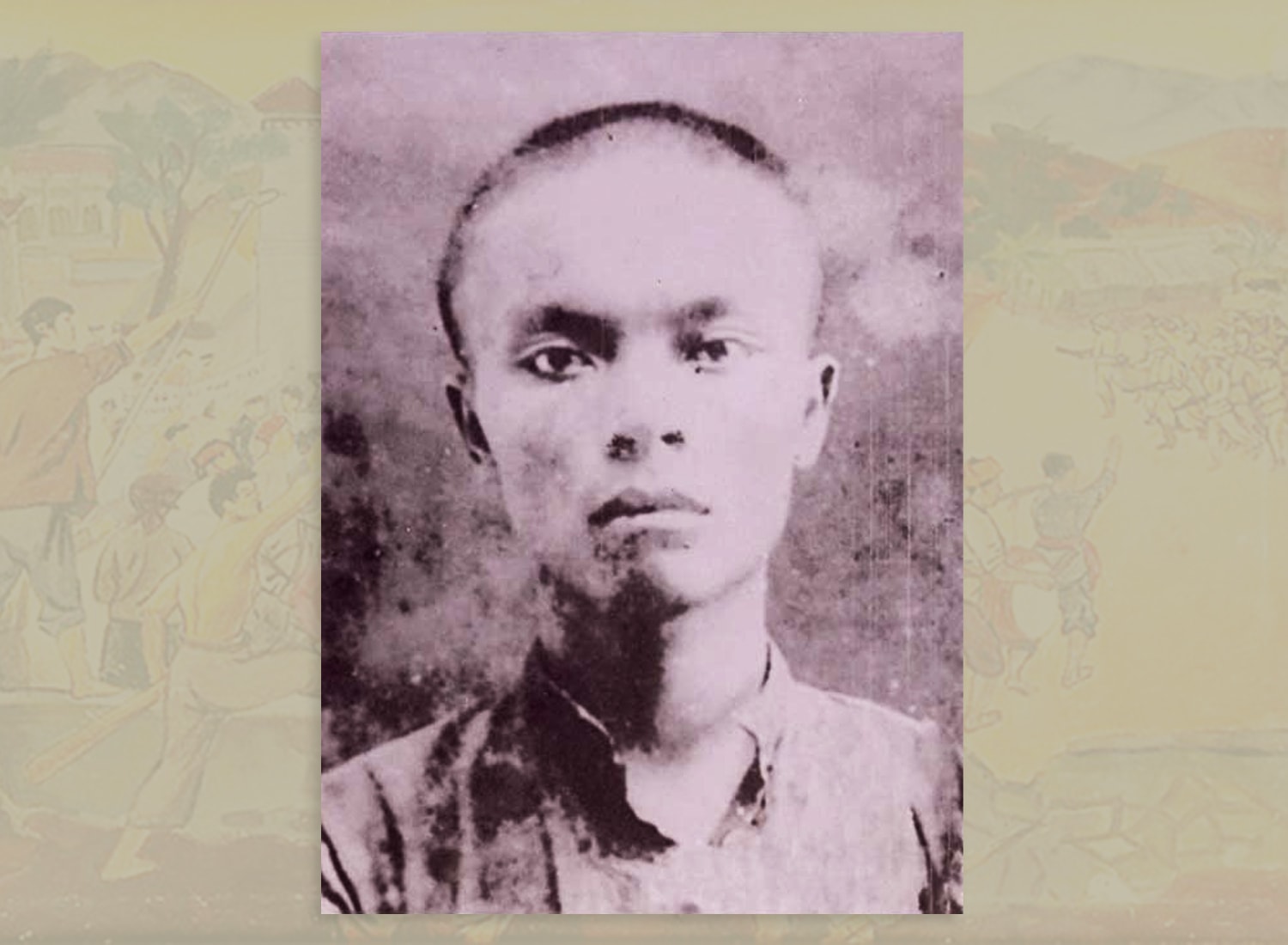
Understanding the desire of the young people to go abroad, Mr. Chu Van Don asked Mrs. Lua (Tran Thi Tram) in Quynh Doi village (Quynh Luu) to find a way to take the group to China. Mrs. Tram was a brave woman, who had taken care of her son Ho Hoc Lam and nephew Ho Tung Mau to go abroad successfully. With Mrs. Tram's guidance, Chu Hue and the group went up Lang Son to go to China. But when Chu Hue's group arrived at Lang Son, they could not pass through the border gate because the secret police were closely guarding it. Mrs. Tram had to lead the group of young people back.
In 1927, there were two strong revolutionary organizations operating in Nghe Tinh: the Tan Viet Party and the Vietnam Revolutionary Youth Association (VNTNCMĐCH), abbreviated as the Youth Association. ComradeNguyen Sy Sachis Secretary of the Vietnam Revolutionary Youth Association.
The new wind of the proletarian revolution, the ideology of Marxism-Leninism and the influence of the Russian October Revolution through the path of the Revolutionary Youth Association had reached Hoang Truong commune. The class of young people eager to go abroad but unsuccessful like Chu Hue enthusiastically joined the VNTNCMĐCH organization in Dien Chau district.
The Youth Association was born in Hoang Truong commune, the association was divided into four groups, in which the first group was organized by comrade Nguyen Nang Tuu (from Nghi Loc) in Mung field including: Chu Hue, Chu Truat, Ho Hung, Chu Duy...; the second group was established by comrade Vo Mai in Trang Ky (Yen Thanh) including: Chu Dam, Chu Trang, and some active youths of Cam Bao village. Later, the two groups merged into one, comrade Chu Hue was in charge and recruited some new youths including: Chu Toan, Ho Tuyen, Ho Xien, Ho Nhiep, Truong Than and Chu Tran. To have a base and fund for the association's activities, the comrades established a Cay Camp in Mung field (now in Dien Lam commune) and organized activities similar to Dang Thuc Hua's Cay Camp in Siam.
In 1928, comrade Vo Nguyen Hien learned from the experience of building a revolutionary base of Hieu Yen Xuan to open the Hung Nghiep Hoi Xa base at Si station. Chu Hue, Ho Hung, Chu Trang, Chu Dam, mobilized many people to contribute construction shares with a face value of 50 dong. Si gas trading house, the base of the association's activities, was born.
The Revolutionary Youth Association of Comrade General Hoang Truong was active and in September 1929 was converted into a branch of the Indochinese Communist Party by Comrade Nguyen Phong Sac - Provisional Secretary of the Indochinese Communist Party.
After the Communist Party of Vietnam was born (February 3, 1930), under the direction of the Central Region Party Committee, district, prefectural, and local Party cells were born one after another. On April 28, 1930, at the meeting of the Executive Committee of the Provisional Prefectural Party Committee of Dien Chau, comrade Nguyen Phong Sac announced the transfer of members of the Indochinese Communist Party cell to the Communist Party of Vietnam cell, including comrades Chu Hue, Ho Hung, Chu Trang... In addition, a new party member was admitted, comrade Chu Truat (younger brother of comrade Chu Trang).
After the Hoang Truong Party cell was established, along with other Party members, Comrade Chu Hue joined the movement, organized the printing of leaflets, made Party flags, and propagated and mobilized the masses to participate in the struggle. On the occasion of the International Labor Day on May 1, 1930, Comrade Chu Hue and his comrades in the cell organized the hanging of the red hammer and sickle flag on the roof of Long An communal house and tall trees in the village. From May to October 1930, under the leadership of Comrade Chu Hue and the Hoang Truong Party cell, the people's struggle movement developed strongly throughout the prefecture, demanding the rights of farmers and protesting against the French colonialists who shot and killed those participating in the struggle movement in Vinh - Ben Thuy, Nam Dan, Thanh Chuong and Hung Nguyen. On the occasion of the 13th anniversary of the Russian October Revolution (November 7, 1930), the Dien Chau Party Committee launched a struggle movement throughout the prefecture. Comrade Chu Hue was appointed by the prefecture committee to be in charge of the overall command in the entire Hoang Truong district.
On the morning of November 7, 1930, more than 2,000 farmers from Hoang Truong commune gathered at Dinh Long An to participate in the demonstration along with the people of Ly Trai and Van Phan communes... and marched to the provincial capital to fight. The group chanted slogans as they walked, protesting against imperialist war, supporting Soviet Russia, reducing taxes for farmers, and making Vietnam completely independent... Frightened by the people's fighting spirit, the enemy frantically opened fire on the demonstration, killing 43 people and injuring dozens of others. On the evening of November 7, 1930, comrade Chu Hue and the Party cell held a memorial service and helped each family with a person who died with 20 dong.
At the end of December 1930, the new executive headquarters consisted of 5 comrades (Chu Hue, Truong Chau, Vu Xuoc, Ho Hung, Ho Nhiep). Comrade Chu Hue was elected as Secretary. Under the leadership of the headquarters, the struggle movement of the people in the area continued to grow, causing the village chiefs to panic and lie still, not daring to act against the revolution. The village chief of Long An village returned the seal to the commune agricultural department, and some had to run to the Western station to seek protection...
The struggle movement of the Dien Chau people developed strongly, many places established Soviet governments. The French colonialists tried every way to drown the movement in a sea of blood. By October 1931, they confiscated property, arrested and burned the houses of comrades in Hoang Truong commune such as: Chu Hue, Le Tai, Le Ty, Ho Nhiep, Ho Tuu, Ho Hien... Comrade Chu Hue was sentenced to 20 years in prison by the Southern Court of Nghe An province and exiled to Lao Bao. In 1935, he was transferred to Ban Me Thuot prison. While in prison, comrade Chu Hue always fought against the harsh regime of the colonialists in prison and looked for every opportunity to escape and return to participate in revolutionary activities.
In 1936, the French Popular Front came to power, the French government issued an amnesty for political prisoners in Indochina. Unable to wait for the amnesty, comrade Chu Hue seized the opportunity and decided to escape from prison.
It is difficult to describe all the dangers of going through the vast forests of the Central Highlands to find a way to the North, to return to his homeland. Being hunted by the enemy, threatened by nature, wild animals and hunger and cold, the road was blocked, Chu Hue was lost alone in the deep forest, so small before nature. At that time, if he did not have the mental strength, determination, intelligence and endurance of an experienced communist like Chu Hue, it would be difficult to overcome. He recounted his escape from prison in 1936 as follows:
“I went in the fifth month (lunar calendar), the first few days I was really hungry, because I couldn’t bring any food with me; but there were still wild bamboo shoots and wild bananas to eat. That day I was hiding in the dense forest, suddenly I saw a trail of blood, I followed it and found out it was a deer that had just been caught by a tiger, eaten, leaving only its big head, I was startled and ran away because I was afraid that the tiger was still lurking somewhere...
That same time, a few days later I caught a huge, long-necked turtle. It wasn't easy to catch it... when I finally managed to tie its neck, I was so happy. I had to endure the pain of handcuffing it... But it was too bad, I didn't have any matches, I tried to find a place where the forest was burning to make fire to roast the turtle, I carried the turtle on my back for two days without finding any fire. I was afraid the turtle would die so I untied the rope around its neck. When I woke up the next morning, oh no! The turtle was nowhere to be found. I had wasted all my effort catching, tying and carrying it, and had to wander around all morning. So I had to endure hunger and thirst while crossing the deep forest..."(Escape from Dak Mil Prison. Thanh Nien Publishing House, 1976, pp. 104-105)
Regarding the period when comrade Chu Hue escaped from Buon Ma Thuot prison for the first time and returned to Nghe Tinh to work, in a letter written to comrade Chu Van Dam, comrade Nguyen Tao also recounted that:
“I was exiled to Lao Bao in 1935, from there I met comrade Chu Hue, in 1942, escaped from Dac Min (Buon Ma Thuot) with comrade Chu Hue, all the brothers from Lao Bao, Buon Ma Thuot clearly saw the fighting spirit and sacrifice of comrade Chu Hue.
In prison, comrade Chu Hue was tenacious, continuously fighting against all brutal acts of oppression by the enemy. There was never a struggle in prison that he did not participate in and he was always a pioneer. In addition, comrade Chu Hue consciously studied politics, culture, and military day and night...
In June 1935, comrade Chu Hue escaped from Buon Ma Thuot exile to build a revolutionary base in Ha Tinh - Nghe An and was arrested by Dinh Van Di's henchmen through secret police...(Preserved at the Party History Research Board of Nghe An Provincial Party Committee).
After traveling over a thousand kilometers of dangerous forest roads and enduring hunger and cold, at the end of 1936, comrade Chu Hue returned to Nghe Tinh to work, contributing to propaganda, mobilization and rekindling the revolutionary fire after the period of white terror of the Nghe Tinh Soviet. Comrade Chu Hue built many grassroots Party cells in Nghia Dan district. After a while, comrade Chu Hue was arrested, this time the Southern Nghe An court increased the sentence to life imprisonment and transferred him to Buon Ma Thuot prison.
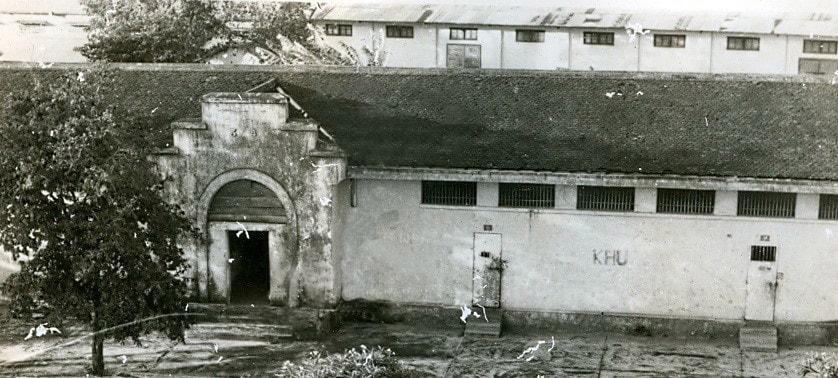
In 1938, comrade Chu Hue organized a second prison break but failed because it was discovered. The prison guards considered comrade Chu Hue to be the most stubborn and dangerous person and they imprisoned him in a solitary cell to separate him from his fellow political prisoners for 1 year. All the prisoners at Buon Ma Thuot prison knew the name of comrade Chu Hue. They respected, trusted and had special feelings for him. Fellow prisoners wrote about comrade Chu Hue:
“Sentenced to life imprisonment, having to stay in prison for 13 years, doing hard labor all day, but at noon and at night, he still studied. In the cell, shackled and chained, he still had paper and books to study... If he couldn't find any paper or ink, he would close his eyes and review the lessons on politics, culture, geography, history... he had learned before.
He was sincere and friendly with his comrades, showing respect for those with a steadfast fighting spirit.
For the enemy, comrade Chu Hue was always the vanguard in the struggles. With a big round head, a high, broad forehead, red eyes, and a voice that made his teeth clench, comrade Chu Hue never retreated before any enemy.
Once, after escaping from Buon Ma Thuot prison, after a year of being out and about, he was recaptured. During a fist fight, Sam, the chief warden in blue uniform guarding Buon Ma Thuot prison, tried to hit Chu Hue on the head with a stick. Chu Hue, whose hands were still chained, quickly ran to pick up a brick, his eyes wide open and red as blood, and told him: "If you touch me, this brick will hit your head right away..." Warden Sam was afraid of Chu Hue and the entire group of eight hundred prisoners, so he had to fight gently..."(Escape from Dak Mil Prison - Ibid. p. 60).
In March 1941, the prison guards made a list of 120 prisoners they considered ringleaders and sent them to Dak Mil; among them, most were communist soldiers in the Nghe Tinh Soviet movement such as: Chu Hue, Truong Van Linh, Nguyen Tao, Tran Huu Doanh...
Dak Mil is a place of sacred forests and poisonous waters, located in the extreme south of Buon Ma Thuot, near the border of Cochinchina and Cambodia, 60 km from Buon Ma Thuot.
Mo-sin, the prison warden, intended to send 120 stubborn political prisoners to Dak Mil to gradually destroy them in the deep, deserted forest through hunger, cold, disease and beatings, but they were wrong. With the spirit, determination, optimism, trust and always proactive attacks of steadfast communists like Chu Hue, Truong Van Linh..., 120 prisoners in a short time improved the living environment of political prisoners. At the same time, they influenced the Ede ethnic prison guards who hated Kinh prisoners because of bad propaganda from the enemy.
To prepare for the successful escape from Dak Mil, comrades Chu Hue, Truong Van Linh, Nguyen Tao, and Tran Huu Doanh sharpened their iron shackles every night to make it easier to get their feet in and out, and prepared compasses, dry food for the road, and four jungle knives. After preparing everything necessary for the escape, on the night of December 5, 1942, the four comrades cleverly tricked the guards into escaping safely.
After more than two months of hardship and difficulty, crossing mountains and forests for more than 1,000 km, on the night of the 30th of Tet (February 4, 1943), comrade Chu Hue andTran Huu Doanhback home
As soon as he returned to his homeland, comrade Chu Hue saw wanted notices with photos of four escaped prisoners in Dak Mil posted everywhere with a reward of 300 Indochinese piastres for each person. The French consul in Vinh ordered the prime minister and secret police of Nghe An and Ha Tinh provinces to hunt down and intercept communist prisoners.
Unable to return to his hometown to avoid falling into enemy hands, comrade Chu Hue went to contact revolutionary bases in Can Loc, Duc Tho (Ha Tinh province), contributing to the establishment of the Vietnam National Salvation Association of Ha Tinh province (April 1943) to lead the construction of the National Salvation Front at all levels, build self-defense forces, establish bases, mobilize the masses to fight against oppression and exploitation by the French and Japanese, and prepare for the opportunity to seize power. Under the direction of comrade Chu Hue, the Vietnam National Salvation Association bases were successively established in the districts of Can Loc, Duc Tho, Thach Ha, Cam Xuyen, and Ky Anh.
Comrades Truong Van Linh and Tran Huu Doanh returned to build a base in Nghe An. After contacting comrade Nguyen Xuan Linh, comrade Truong Van Linh planned to build a base in Vinh as a foothold to expand operations throughout the province, while comrade Tran Huu Doanh returned to build a base in the midland and mountainous areas of Thanh Chuong and Anh Son as a long-term base of operations. Comrade Nguyen Tao operated in Bac Ky.
Because they did not grasp the new situation, the comrades could not expand their areas of operation. The Vietnam National Salvation Association of Ha Tinh province and its bases were destroyed by secret police after three months of operation. Comrade Chu Hue was re-arrested along with many cadres, party members and people in bases in the province. Comrade Chu Hue was transferred to Buon Ma Thuot prison. After the French coup (March 9, 1945), the Japanese opened Buon Ma Thuot prison and released political prisoners. They coaxed the prisoners to stay and work for them. However, the loyal party members of the Nghe Tinh Soviet movement refused and quickly returned home to continue participating in revolutionary activities.
Returning to operate in the Nghia Dan, Quy Hop, and Quy Chau regions, comrade Chu Hue and comrades like Phan Dinh Lai mobilized the masses to fight to seize power.
On August 22, 1945, the revolutionary government was handed over to the people, and comrade Chu Hue was a member of the Provisional Executive Committee in charge of the police. In early 1946, comrade Chu Hue was assigned by the Provincial Party Committee to work in Quy Chau district; later, he was assigned by the Central Committee to the Hanoi Police Department.
At the end of 1946, comrade Chu Hue returned to work in the Phu Quy area (Nghia Dan, Quy Hop, Quy Chau).
Due to years of torture by the enemy in prison, comrade Chu Hue suffered from a serious illness and passed away on September 30, 1956, to the regret of his family, friends and comrades.

